Rewilding Me
#MeWilding
The pandemic has touched everyone in different ways and for Sam Wilson, a geologist from Edinburgh, it has profoundly changed her perspective on the sights, sounds and smells of nature close to home.

"I've come to realise that rewilding is not about geography, it's something that starts within."
If I had been asked in 2019 whether my connection with nature was important to me, I would have answered unequivocally, yes.
During our married life, Michael and I have been fortunate enough to watch colonies of emerald green bee-eaters in Africa, hike glacial trails searching for bears, and photograph bison and wolves against a backdrop of ethereal volcanic steam in Yellowstone.
Despite our extensive travels, it was only during the recent series of lockdowns that I experienced a startling revelation. I realised that over the past decade or so, I had unwittingly lost touch with the day-to-day experience of local nature. I felt that wildness was something I could only enjoy in short, euphoric doses, by travelling great distances and by spending a lot of money.
My family lived in Zambia when I was young and my appreciation for nature was instilled early on. At home, I ran barefoot on warm, drought-resistant grass and shinned up sweet-scented guava trees beside the henhouse. On epic road trips to wildlife hotspots, we bounced around in our 4x4, watching the magnificent wildlife of Africa play out their lives. At night, I fell asleep listening to thunder and the lashing of equatorial rain.
In 1993, our family moved to a little granite cottage in Cornwall. We swapped safaris for walks on Bodmin Moor and I photographed the spooky standing stones and lichen-festooned trees. In winter we picked holly sprigs and pinecones to decorate the house, and, on clear nights, the Milky Way hung above our cottage like a wide ribbon. Here, as in Zambia, nature remained central to our lives.
I now live on the outskirts of Edinburgh, in a respectable suburban village with potted trees and neat lawns. As my husband and I began to work ever-longer hours, we yearned for more time away, canoeing in Canada or climbing Kilimanjaro. But in 2014, we were blindsided when my Dad developed a rare type of dementia. Juggling a burgeoning workload and the demands of my father’s illness, nature became a luxury rather than a necessity. Our occasional weekends of hiking and camping dwindled away, and for the most part, I was too exhausted to harbour any enthusiasm. Increasingly, I felt that the only respite was to be found in those few precious weeks a year when we could flee to some remote place. Only then could I finally take a breath.
Climate change, human overpopulation, deforestation and plastic waste became omnipresent in my thoughts and I felt hemmed in by burgeoning human development, suffocated by litter and waste. When Dad died in the summer of 2019, we reflected on a tough few years and held on to the hope that things would get a little easier. But, as soon as 2020 was underway, everything stopped.
I was aware that scientifically, a global pandemic was precedented, but it still seemed inconceivable that the juggernaut that is our society could be brought to such an abrupt halt. Of course, I was concerned like everyone, but there slowly emerged a sense of new possibilities. Furloughed, I found myself for the first time in my adult life with no immediate responsibilities. And so, Michael and I began to walk.
Our village is surrounded by arable farms criss-crossed by single-track country roads. Some weave in and out of a country estate fringed with scraps of woodland, from which we can see the Firth of Forth. At first, the roads were lined with daffodils and the hedges laden with buds. Our breath formed white plumes as we stopped to inspect flowers. Wild cherries and hawthorn exploded into blossom, and red and white campion appeared at their bases. In the fields, goldfinches scattered ahead of us, chattering loudly.
The weather warmed as the seasons shifted and the grass lengthened to knee and then waist height, mercifully unmowed. Rosebay willowherb packed the roadside verges along with foxgloves and comfrey. The trees were rowdy with birdsong, and the rich aroma of plant life engulfed us. We named the farm horses and said hello as we passed each day. In the fields, red splashes of poppies appeared and we watched a pair of sleek, elegant hares chasing each other. The gorse on the fringe of the wood developed its piña colada scent and tiny, perfect wild strawberries glistened ruby-red in the dew. Kestrels hovered by the motorway bridge, occasionally diving, and each day we heard the buzz of the thronging beehives. One afternoon, a weasel stopped in the middle of the road and watched us quizzically before darting into the hedge.
"Slowly, I experienced the reawakening of the profound wonder that I have only previously felt in some of the world's most remote places."
We walked on the sunny days, and on the rainy ones too. I learned the names of all the wildflowers and each day, I found a new bird call to identify, a new question to Google when we got home. In the rippling wheat fields, tractors began the harvest. One wet, chilly day a fox stopped and regarded us from the railway tracks. The intelligence in his gaze made the discomfort of walking in the downpour worthwhile. We met other villagers and made new friends. As the weather began to change, we often saw deer grazing between the golden bales. The hedgerows filled with a bounty of apples, rosehips and rowan berries. One evening, time hung enchantedly still as we watched a badger and her cubs playing in the woods at twilight.
Slowly, I experienced the reawakening of the profound wonder that I have only previously felt in some of the world’s most remote places, a paradoxically comforting sense of my own great insignificance. Around me, were merely hedgerows and fields inhabited by foxes and hares and badgers, not vast tracts of pristine, perilous wilderness. I was not returning the penetrating gaze of a lion or a bear and yet, it moved me. The nature I have encountered this year has been every day and familiar, but, like the swallowtails or the falling snowflakes of my childhood, it is still intensely magical. I realised that during lockdown, nature had been slowly, inexorably, rewilding me.
We’re back at work now. Once again, we can see our breath on the air when we walk. The leaves are acid yellow, or deep crimson, the main road garlanded with berries. Amongst the trees, an assortment of improbably shaped fungi has sprung up. At night, bats swoop and arc through our head torch beams on the hunt for bugs. I have noticed that I can’t hear them anymore. I guess I’m too old now, but I don’t mind. I have a renewed sense of oneness with the landscape, a deep contentment and tranquillity that is helping me to work smarter and relax better. I now recognise that allowing myself to become divorced from nature was a critical mistake, one that many of us understandably make. But we are not apart from nature, we are of it; to be disconnected from nature is to be disconnected, in a fundamental way, from ourselves.
The wonders of nature are all around and if we quiet our minds and open our eyes, we will see them. They are there and their power is life affirming. Having experienced this personal revelation, I believe that it is more urgent than ever that we not only preserve what little remains of the wild, but that we apply ourselves passionately to restoring and expanding it. If even the beleaguered scraps of the wild that border our fields can inspire such positive change, then we can only imagine the benefits that true wildness on our doorsteps could bring us. Increasingly, medical science is coming to understand that our connection to nature is essential for our wellbeing, and forward-thinking doctors can already prescribe time in nature to alleviate stress, depression and other conditions.
"I realised that during lockdown, nature had been slowly, inexorably, rewilding me."
As we forge ever deeper into the world’s wild places, encountering, consuming and commoditising greater numbers of species, the likelihood of virus outbreaks grows. The COVID-19 crisis is a clear symptom of our dysfunctional relationship with the natural world, but it also affords us the opportunity to stand back and take stock.
Some people imagine that rewilding is a fanciful dream of a pristine landscape devoid of humanity, but the true vision is one of restored ecosystems functioning side-by-side with prosperous communities. It is not only a dream of protection and restoration for wildlife, forests and wetlands, but one of ingenuity, justice and modernity for humanity, where the precious benefits of nature are no longer isolated, depleted, over-managed and only accessible to the few.
I will continue to dream of the wild in far-flung corners of the world, but I’ve come to realise that rewilding is not about geography, it’s something that starts within.

